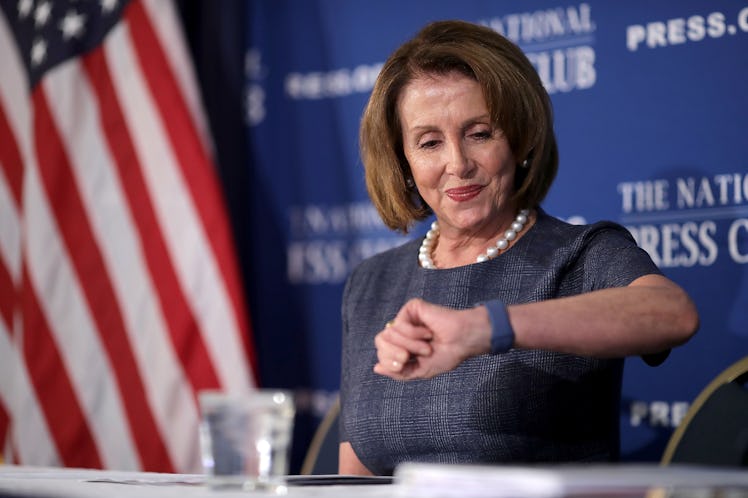
Trump Says He Wants To Work Better With Democrats In 2018, So Let's See How It Goes
With his signature now officially on the Tax Cuts and Jobs Act, President Donald Trump completed a process that saw Republicans pass a bill through Congress with zero Democratic votes. In 2018, though, the president is looking for something different, he says. On Friday morning, Dec. 22, Trump tweeted about working with Democrats, predicting that Republicans and their opposing party will work together "for the good of the country."
"At some point, and for the good of the country, I predict we will start working with the Democrats in a Bipartisan fashion," Trump tweeted, before citing a specific issue that both parties can work together on. "Infrastructure would be a perfect place to start. After having foolishly spent $7 trillion in the Middle East, it is time to start rebuilding our country!"
Trump's tweet about bipartisan echoes a message recently expressed by another leading Republican: Senate Majority Leader Mitch McConnell (R-KY). "This has not been a very bipartisan year," McConnell told NPR. "I hope in the new year, we're going to pivot here and become more cooperative".
Put together, Trump and McConnell's comments signal a desire (however strong or weak) to shift away from how Washington D.C. worked in 2017. Trump's tenure began with the president nominating conservative judge Neil Gorsuch to the Supreme Court, a nomination which followed months of McConnell refusing to hold a hearing for former President Barack Obama's nomination to the Supreme Court, Merrick Garland. Gorsuch was confirmed after receiving just three Democratic votes.
As the year went on, Republicans in Congress made multiple attempts to repeal the Affordable Care Act, otherwise known as Obamacare. Each attempt, which was ultimately unsuccessful, proceeded without a single Democratic vote. Before the year's end, Republicans in Congress have passed and brought to law a tax reform bill that, predictably, did not receive a single Democratic vote.
Now, however, both McConnell and Trump have shifted and said 2018 should be different. The Senate majority leader has already said he thinks his party will move on from trying to repeal Obamacare. "Well, we obviously were unable to completely repeal and replace with a 52-48 Senate," McConnell told NPR. "We'll have to take a look at what that looks like with a 51-49 Senate. But I think we'll probably move on to other issues."
In addition, McConnell has already diverged from the messaging of House speaker Paul Ryan (R-WI), who has said Republicans should target entitlement reform in 2018 (i.e. an effort to cut funding to social programs like Medicare and Medicaid in order to balance the budget and reduce debt). In his interview with NPR, McConnell had other ideas.
"I think entitlement changes, to be sustained, almost always have to be bipartisan," the Senate majority leader said. "The House may have a different agenda. If our Democratic friends in the Senate want to join us to tackle any kind of entitlement reform, I'd be happy to take a look at it."
Meanwhile, Trump's mention of infrastructure as the "perfect place to start" falls in line with the fact that the president's proposed idea of investing $1 trillion in infrastructure nationwide has long been an issue been touted as one Democrats could get on board with.
Trump's goodwill wasn't extended to everyone, however. Two hours after tweeting about bipartisan efforts in Washington D.C., Trump went on to talk about the "Fake Mainstream Media."
Despite the president's tweet and McConnell's recent interview, Republicans and Democrats still have some debating to take on in the near future. Since Congress only passed a temporary funding bill — which will fund the government for about a month — both parties will have to come back to Washington after the new year and engage in negotiations over contentious issues like immigration.
So, whether or not the bipartisan rhetoric stays for long will be something to watch.